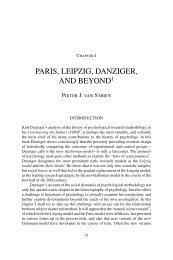The positivist repudiation of Wundt - Kurt Danziger
The positivist repudiation of Wundt - Kurt Danziger
The positivist repudiation of Wundt - Kurt Danziger
You also want an ePaper? Increase the reach of your titles
YUMPU automatically turns print PDFs into web optimized ePapers that Google loves.
226 KURT DANZIGER<br />
ple <strong>of</strong> Priignanz, for example, is a principle <strong>of</strong> psychic causality, formally not dissimilar<br />
to the kinds <strong>of</strong> principles <strong>Wundt</strong> developed. <strong>Kurt</strong> Lewin’s concept <strong>of</strong> the life space, in<br />
which only psychological forces could have psychological effects, is a further develop-<br />
ment <strong>of</strong> the idea, and theories <strong>of</strong> cognitive balance and dissonance represent some <strong>of</strong> its<br />
more recent incarnations. Freud committed himself to psychic causality with the princi-<br />
ple <strong>of</strong> psychic determinism which came to play such a central role in his system. But none<br />
<strong>of</strong> these later attempts to provide psychology with its own form <strong>of</strong> causality appear to<br />
have owed anything to <strong>Wundt</strong>’s treatment <strong>of</strong> the to pi^.^'<br />
Nevertheless, the clash between <strong>Wundt</strong> and the <strong>positivist</strong>s remains historically in-<br />
structive. It foreshadowed the most general, the most significant line <strong>of</strong> division among<br />
psychologists during the years to come. That division was based on conflicting<br />
philosophies <strong>of</strong> science. On the one hand, there were those whose conception <strong>of</strong> the<br />
nature <strong>of</strong> science was essentially Machian and for whom psychology was part <strong>of</strong> a<br />
hierarchical system <strong>of</strong> the sciences in which the aim <strong>of</strong> explanation was the reduction <strong>of</strong><br />
each level <strong>of</strong> generalization to the next, more fundamental, level. On the other hand,<br />
there were those who regarded science as aiming at more than the economical formula-<br />
tion <strong>of</strong> functional relationships and whose affirmation <strong>of</strong> a specifically psychological<br />
level <strong>of</strong> causality, in whatever form, opened doors to the humanistic disciplines. This<br />
division was marked by successive attempts to reformulate the theories <strong>of</strong> the second<br />
type in terms that were acceptable to the <strong>positivist</strong> ethos, attempts that necessarily<br />
deprived those theories <strong>of</strong> their essential content and changed them into something far<br />
removed from the original conception. (Attempts to reformulate Freudian theories in<br />
behaviorist terms represent extreme examples <strong>of</strong> this trend.) This sterile process was<br />
largely determined by the fact that in psychology positivism had become identified with<br />
scientific orthodoxy. Those who found themselves outside the <strong>positivist</strong> pale were <strong>of</strong>ten<br />
hampered by a failure to appreciate the real nature <strong>of</strong> the division which, <strong>of</strong> course, in-<br />
volved much more than strictly psychological questions. In this respect they might have<br />
pr<strong>of</strong>ited from <strong>Wundt</strong>’s remarkable insights into the nature <strong>of</strong> the issues raised by psy-<br />
chology’s status as a science.<br />
NOTES<br />
I. It was C. H. Judd, the chosen translator <strong>of</strong> the Grundriss, who faithfully represented the spirit <strong>of</strong><br />
<strong>Wundt</strong>’s psychology in America, not Titchener. For a general expression <strong>of</strong> that spirit see Judd’s autobiographical<br />
statement in Carl Murchison, A History <strong>of</strong> Psychology in Autobiography (Worcester, Mass.:<br />
Clark University Press, 1932). See also Richard J. Anderson, “<strong>The</strong> Untranslated Content <strong>of</strong> <strong>Wundt</strong>’s<br />
Grundziige der physiologischen Psychologie,” Journal <strong>of</strong> the History <strong>of</strong> the Behavioral Sciences I 1 (1975):<br />
381-386. An excellent contemporary analysis <strong>of</strong> the fundamental principles <strong>of</strong> <strong>Wundt</strong>’s psychology is to be<br />
found in Arthur L. Blumenthal, “A Reappraisal <strong>of</strong> Wilhelm <strong>Wundt</strong>,” American Psychologist 30 (1975):<br />
1081-1088. See also D. B. Klein, A Hisfory <strong>of</strong> Scientific Psychology (New York: Basic Books, 1970).<br />
2. At least he notes the Machian position <strong>of</strong> KUlpe and Titchener; for some reason he does not make it<br />
explicit that Ebbinghaus adopted the same position. See Edwin G. Boring, A History <strong>of</strong> Experimental<br />
Ps.ychology, 2d ed. (New York: Appleton-Century-Cr<strong>of</strong>ts, 1950), chap. 18.<br />
3. Rudolf Willy, “Die Krisis in der Psychologie,” Vierteljahrschrvt Jur wissenschaftliche Philosophie<br />
21 (1897): 79-96.<br />
4. Boring, Experimental Psychology, p. 431. Boring’s notion <strong>of</strong> orthodoxy excludes a major part <strong>of</strong><br />
European experimental psychology, including the majority <strong>of</strong> <strong>Wundt</strong>’s disciples, the most prominent<br />
<strong>of</strong> whom formed the so-called second Leipzig school - men like Krueger, Wirth, and Sander.





